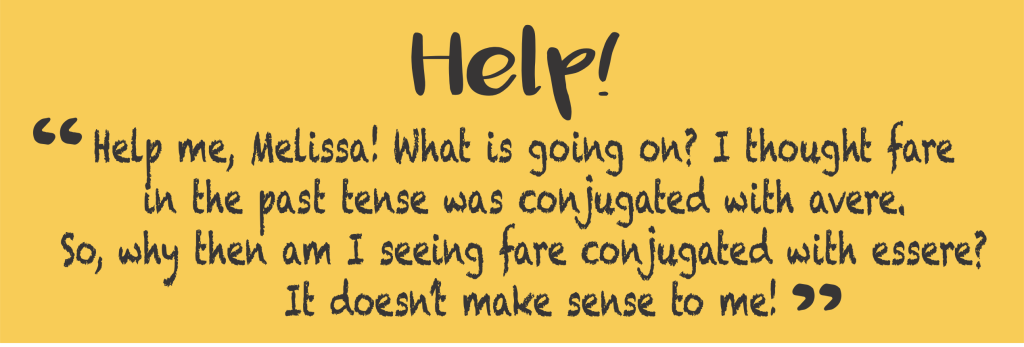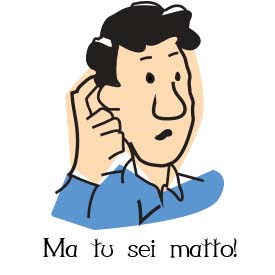
Verbo italiano “farsi”. Cosa significa e come si coniuga (giuro che non ti farà male!)
Ho deciso di mettere in evidenza il verbo farsi oggi perché l’altro giorno una studentessa mi ha scritto un’e-mail dicendo che era molto confusa quando ha visto la costruzione: sei fatta male.
I decided to highlight the verb farsi today because a student emailed me the other day saying she was very confused when she saw the construction: sei fatta male.


La ragione della confusione di questa studentessa è che la parola in realtà non è fare ma piuttosto farsi. Ora, quando dico farsi non mi riferisco alla lingua persiana farsi, la lingua ufficiale dell’Iran. No, mi riferisco al verbo riflessivo italiano “farsi” che significa: diventare, crescere, fissare, prepararsi. Ciò che mancava nella frase: sei fatta male, rendendola così confusa, era il pronome riflessivo “ti”.
The reason for this student’s confusion is that the word isn’t actually fare but rather farsi. Now, when I say farsi I’m not referring to the Persian language Farsi, the official language of Iran. No, I’m referring to the reflexive Italian verb “farsi” that means: to become, to grow into, fix, prepare for oneself. What was missing in the sentence: sei fatta male, making it so confusing, was the reflexive pronoun “ti.”
Torniamo un po’ indietro. Se sei uno studente di italiano sai ormai che la parola fare è il verbo italiano per “creare” o “realizzare”. È uno dei primi verbi essenziali che gli studenti imparano proprio lassù con i verbi: essere, avere, parlare ed andare.
Let’s back up a bit. If you are a student of Italian you know by now that the word fare is the Italian verb for “to do” or “to make.” It is one of the first essential verbs that students learn and it is right up there with the verbs: essere, avere, parlare, and andare.
Diamo un’occhiata al verbo italiano “fare”
nelle coniugazioni del presente
e del passato semplice.
Let’s look at the Italian verb “fare”
in the present and simple past conjugations.
When the verb fare is conjugated in the past tense,
the verb avere is used.
Present
Io faccio
tu fai
lui, lei, Lei fa
noi facciamo
voi fate
loro, Loro fanno
Past
Io ho fatto
tu hai fatto
lui, lei, Lei ha fatto
noi abbiamo fatto
voi avete fatto
loro, Loro hanno fatto
Ora, diamo un’occhiata al verbo riflessivo italiano farsi nel presente e nel passato semplice.
Now, let’s look at the Italian reflexive verb farsi
in the present and simple past.
When the verb farsi is conjugated in the past tense,
as with all reflexive verbs, the verb essere is used
and must agree with the gender and number.
Present
Io mi faccio
tu ti fai
lui, lei, Lei si fa
noi ci facciamo
voi vi fate
loro, Loro si fanno
Past
Io mi sono fatto/a
tu ti sei fatto/a
lui, lei, Lei si è fatto/a
noi ci siamo fatti/e
voi vi siete fatti/e
loro, Loro si sonno fatti/e

Farsi is used to express getting hurt or something hurts you.
Farsi male
“Accidenti, mi sono fatta proprio male! (A woman saying this)
“Darn it, I really hurt myself!
Non ti farà male!
It won’t hurt you.
Mi sono fatto male! (A man)
“I hurt myself!”
Ti sei fatto male? (asking a male friend)
Did you hurt yourself?
Ti sei fatta male? (asking a female friend)
Did you hurt yourself?
Ci siamo fatti male bunjee jumping! (we hurt ourselves)
We hurt ourselves bunjee jumping.
Ti sei fatta male quando sei caduta dal cielo?
Did it hurt when you fell from heaven?.
Polite Lei Form: Si è fatto/a male?
Other uses of farsi

Farsi la barba = to shave oneself
Mi faccio la barba.
I shave my beard.
Si fa la barba.
He shaves his beard
Farsi un livido = to bruise onself
Mi sono fatto/a un livido sulla gamba.
I’ve bruised my leg.

Farsi male a = To explain what part of your body you have hurt
Mi sono fatta male alla schiena. (Woman speaking)
I hurt my back.
Mi sono fatto male al gomito (Man speaking)
I hurt my elbow.
Mi fa male = it is hurting
Mi fa male il piede.
My foot is hurting me.
Sfumature di farsi / Other nuances of farsi
Farsi = prepare qualcosa
Per pranzo ci siamo fatti due spaghetti.
I fixed myself spaghetti.
Farsi = to take, make, have
Stanotte mi sono fatto proprio una bella dormita.
Last night I slept really well.
Farsi = to become
Anna si è fatta proprio una bella ragazzza.
Anna has become a really pretty young woman.
Farsi = to take drugs
In quella scuola ci sono parecchi ragazzi che si fanno.
In that school, there are a lot of kids who take drugs.
And just so you know…
Farsi = is also used to refer in slangy vulgar way of saying to have sex
Mi ha detto che è riuscita a farsi il cameriere.
She told me she managed to “do” the waiter.












Cara Studentessa matta,
La sua spiegazione mi sono fatto bene, a capire meglio il significato del riflessivo “farsi”.
Grazie
That’s all good and useful. Thanks. But a real problem for me is where farsi is followed by an infinitive of an active verb which then mysteriously becomes transformed into a passive! For example: “mi sono fatto capire” – “I made myself understood”; or “mi sono fatto conoscere” – “I made myself known”. I really struggle with this: I can see what (as a matter of fact) it means, but I can’t for the life of me see why it means it! I really would be grateful for any help!
Ciao Vincent, Thanks for you your question. If you understand what it means in theory you just have to accept that and not try to translate it literally into English. Take for example “Fammi sapere. = Let me know.” This is a good one to use at the end an email (if you can make it, if you can meet me, if this will work with your plans)… I use it all the time and it has become a habit. Sometimes you have to just learn phrases and not overthink it.
But I get your pain. I struggled with this construction for a long time: Volevo congratularmi. (which means “I wanted to congratulate you.” But, I saw it as “I wanted to congratulate myself.” LOL )
I’m not sure if I answered you question. If not, feel free to write me again. A presto. Melissa